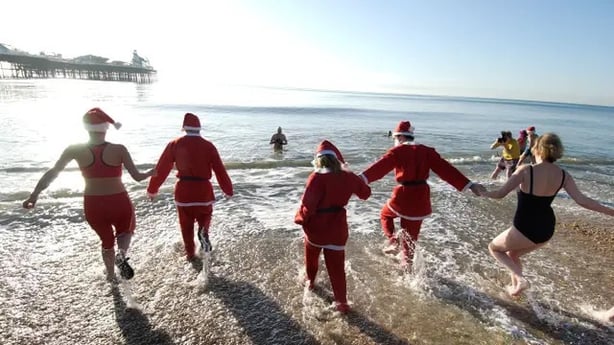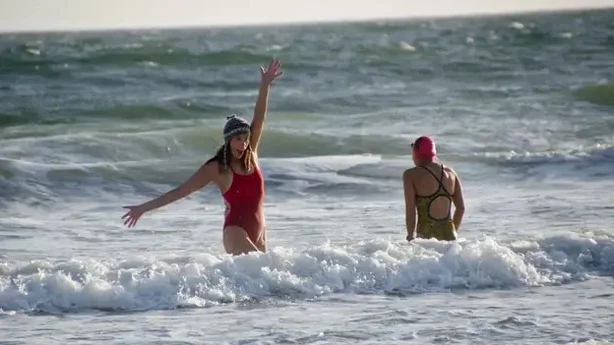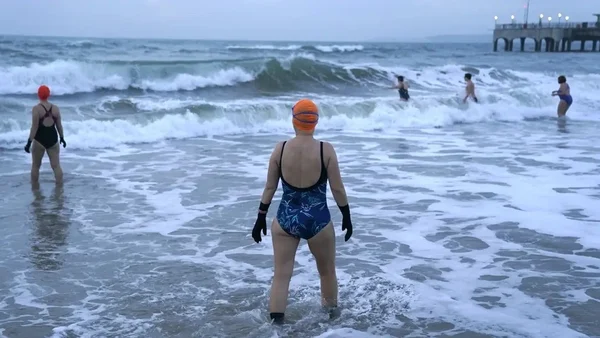Many people see in the New Year or celebrate Christmas or St. Stephens' Day with a cold water swim – often in fancy dress or just a swimsuit to get chilly in the winter water.
"Research suggests that cold water swimming has a wide variety of health benefits including mood improvement linked with the release of ‘feel good’ brain chemicals, reduced depression, and improvement in general wellbeing. Cold water swimming can also have cardiovascular benefits," says GP Dr. Nina Aslam from Puressentiel.
However, safety is obviously something to be wary of when it comes to cold water swimming – also known as winter swimming or ice swimming.

"[It] requires preparation and acclimatisation and should be done with a group of people, not on your own," warns Aslam. "Warm up your leg and arm muscles before you wade in. Don’t jump into cold water, rather wade in slowly up to your waist, dip your shoulders into the water then swim."
But what happens to different parts of our bodies when we take our festive dip?
Lungs
Ever jumped in a cold pool and suddenly felt like you can’t breathe?
"The first stage following full immersion is known as ‘cold shock’. In the first few seconds your lungs contract. This [can be] followed by uncontrollable rapid or deep breathing – hyperventilation – and loss of breathing control," says Aslam. It wouldn’t necessarily happen to regular, acclimatised swimmers (although it may). But, she says: "If you are not a regular cold water swimmer, this can happen as a physiological reaction."
Heart
Our hearts react quickly to the shock.
"Your heart rate, blood pressure and output of blood from the heart – cardiac output – increase rapidly," Aslam says.
If you are fit and healthy then this isn’t necessarily something to worry about. However it may be, "if you have not done this type of activity before – and let’s say have a full stomach from Christmas dinner plus consumed a few alcohol-based drinks".

Skin
"Swimming in cold water can actually change your complexion slightly. Due to the increased heart rate and blood flow your skin will get a healthy glow for a short time after you’ve finished," says Dr Rhianna McClymont, a GP at online healthcare service Livi
Brain
Swimming in cold water makes your brain produce more endorphins – a hormone that makes us feel good and can even relieve pain – to combat the stressful feelings created by the quick change in environment, McClymont explains.
"This kind of activity has also been shown to be beneficial for our mental health too. Regular cold water swimming can help us to cope better with different types of stress, as the body starts to learn how to regulate our stress hormones," she notes.
"Not only are these changes internally happening, but the increase in adrenaline from being in cold water can create a feeling of euphoria, [due to] the release of endorphins. As a result, cold water swimming or a cold bath can improve our overall mood, confidence, and even libido."

Our limbs
There’s a reason we feel the cold most in our extremities; like hands, feet, arms and legs.
Aslam explains: "Blood vessels in the periphery – such as the skin, feet, toes, hands and fingers – constrict. It’s a response which is the result of the action of ‘cold receptors in the periphery peaking after 30 seconds with adaptation taking a couple of minutes or so.
"Once a swimmer is able to bring their breathing under control following the first two-minute phase of cold exposure, they enter the second phase of short-term exposure," she adds.
"During this phase, the muscle and nerve function is affected, particularly in the arms, head and neck. Biochemical activity in the body cells, muscles and nerves is interrupted. As the muscles cool further, there may be an increased sense of pain."
Before you go for a dip, be sure to check the water quality and stay up to date on water safety guidelines.



